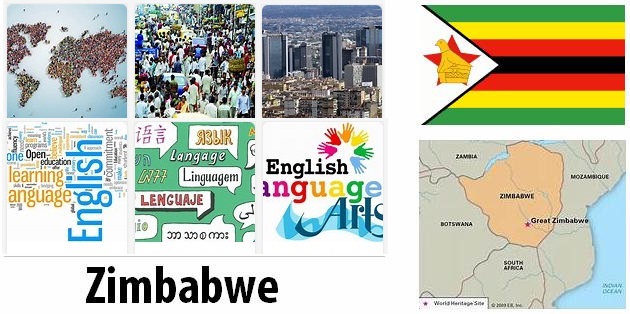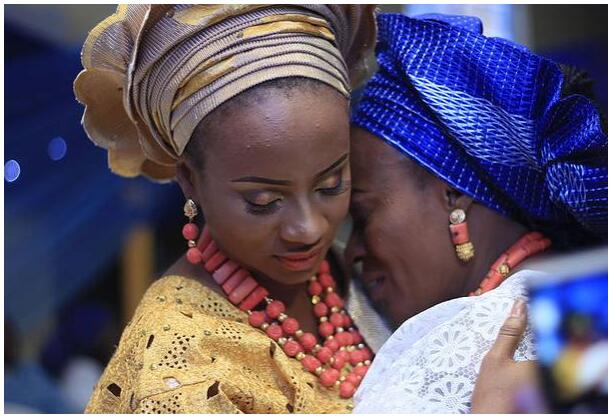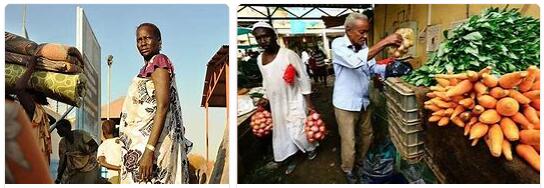Zimbabwe Population and Language
Almost the entire population of Zimbabwe belongs to one of the two Bantu people, Shona and Ndebele. Two out of three residents live in the countryside, but the move into the cities is extensive. Slums have grown up around the larger cities.
Shona, which accounts for up to 80 percent of the population, lives in eastern and northern Zimbabwe and in Moshonaland in the northeast. Shona is divided into subgroups that speak different dialects. In the southern and western parts of Zimbabwe, Matabeleland, ndebele dominates, where 15-20 percent of Zimbabweans are counted.
- COUNTRYAAH.COM: Key populations estimated size and data of Zimbabwe, including population density of how many people per square mile. Also included are facts for population and language.
A small minority are descendants of Europeans and Asians who came to the area during the colonial period, mainly in the 19th century (see Older history). At independence in 1980, around 200,000 whites lived in the country, but many have since resigned. At a 2012 census, the number was down to just under 30,000. In the early 2000s, the majority of white landowners got their farms confiscated in a violent land reform (see Modern History as well as Agriculture and Fisheries). Most white Zimbabweans are now city dwellers.
Other Zimbabweans belong to a number of smaller African peoples such as kalanga, tonga, venda, sena, hlengwe, sotho and shangaan.
Population growth is high. For a few years after the turn of the millennium, the pace slowed down as a result of high mortality in the AIDS epidemic (see Social conditions) and mass emigration (see below). Now the rate has increased again rapidly, which contributes to the population being young: just over four out of ten residents are under 15 and barely one in 20 over 65.
Economic disintegration and political chaos since the turn of the millennium (see Economic overview and Modern history) have led many to leave the country to look for jobs elsewhere. The figures are uncertain, but it is said that maybe three million Zimbabweans are abroad, mainly in neighboring countries.
Shona or ndebele are spoken in everyday life by most black Zimbabweans and are compulsory subjects in the school. Many also speak English among themselves, especially in the cities. With a new constitution that was adopted in 2013, there are 16 officially recognized languages, one of which is sign language.
FACTS – POPULATION AND LANGUAGE
Population
shona about 70-80%, ndebele about 15-20%, small minorities of other Bantu people, whites and Asians
Number of residents
16 529 904 (2017)
Number of residents per square kilometer
43 (2017)
Percentage of residents in the cities
32.2 percent (2017)
Nativity / birth
33.1 per 1000 residents (2016)
Mortality / mortality
8.1 per 1000 residents (2016)
POPULATION GROWTH
2.3 percent (2017)
fertility rate
3.8 number of births per woman (2016)
Percentage of women
51.3 percent (2017)
Life expectancy
61 years (2016)
Life expectancy for women
63 years (2016)
Life expectancy for men
59 years (2016)
Language
English, Shona and Ndebele are official languages
2010
December
candidate Presentation
Mugabe, who has started propagating for elections in 2011, is officially presented as Zanu-PF’s candidate.
September
Election Plans
Tsvangirai and Mugabe are reported to have agreed to respect the outcome of the new elections scheduled for 2011. But the Election Commission states that it is not practically possible to establish proper voting lengths, and according to the finance officials, the money in the Treasury is not enough for both a referendum on a new constitution, and choice.
July
Trouble at public meetings
Public meetings which, according to the power sharing agreement, are to be held to reflect the public’s views on a new constitution for the first time, one year later than originally intended. The meetings are characterized by riots and violence and have few participants.
March
New Human Rights Commission
Zimbabwe’s first human rights commission is set up, as well as a new electoral commission, in accordance with the power-sharing agreement.
New stock rules create contradictions
New rules come into force that say that foreign companies worth more than half a million US dollars must sell at least 51 percent of their shares to black Zimbabweans within five years. Critics see it as a continuation of the policy that confiscated agricultural land owned by whites by the state, and which many considered paved the way for Zimbabwe’s economic crisis. Tsvangirai opposes the law and the contradictions within the government are sharpened.
February
Sanctions Extension
The EU and the US are extending their sanctions because of the slow progress in fulfilling the power-sharing agreement.




